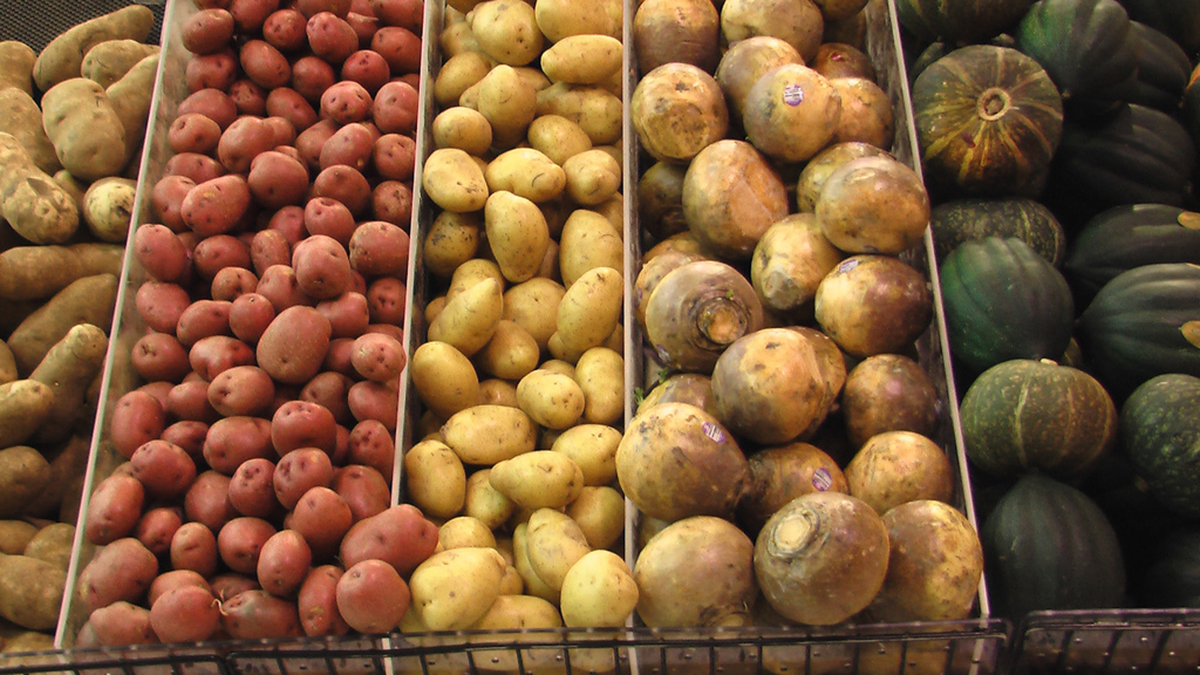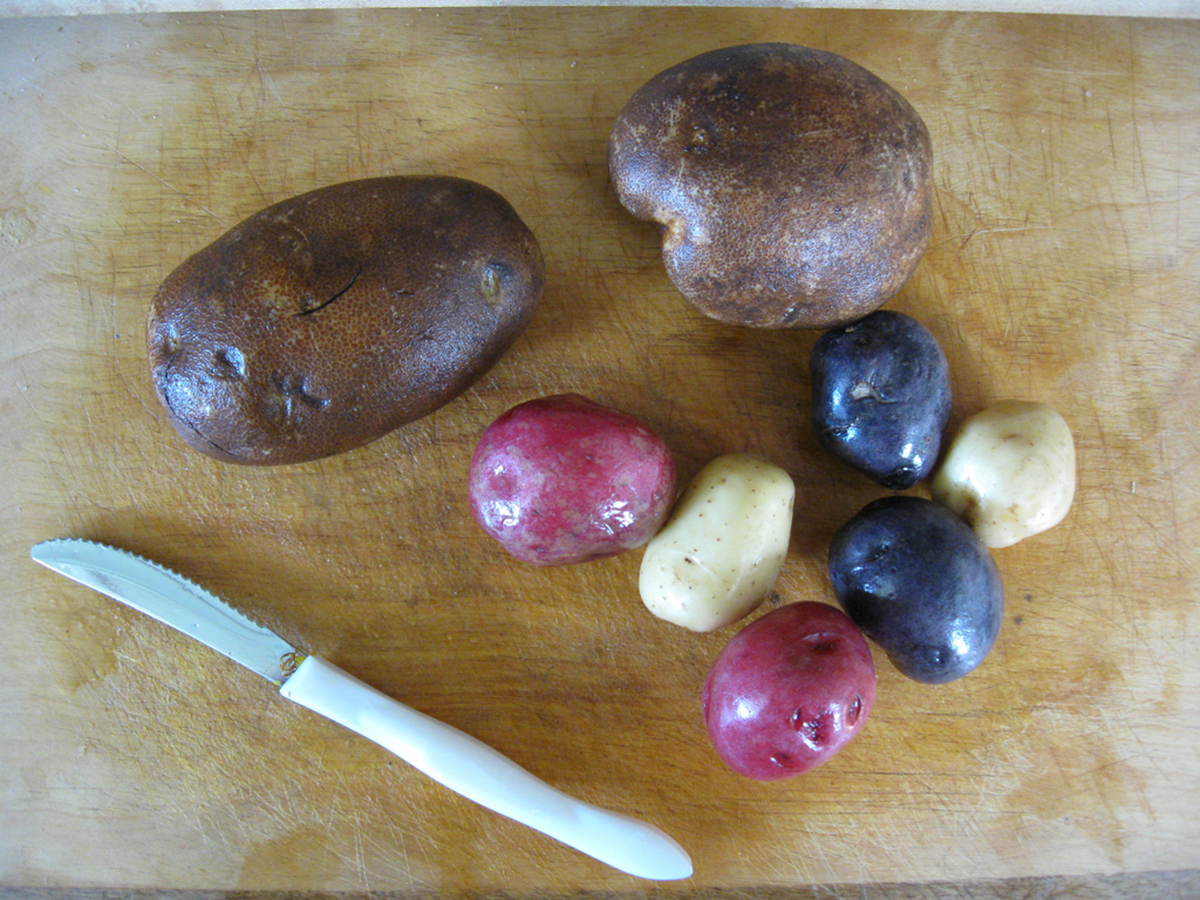Potatoes are the newest nutritional villain, or at least one study tries to convince us that they are.
Three researchers at Brigham and Women's Hospital in Boston and the Harvard School of Public Health recently published a study that claims that eliminating one serving of potatoes per day lowers the risk of high blood pressure by 7 percent.

The study doesn't say that eliminating one serving of potatoes per day will lower your blood pressure by 7 percent. It says that if everybody in the universe eliminated on average on serving of potatoes per day then 7 percent fewer people would be diagnosed with high blood pressure (although potato chips may be OK, the study says). And actually, the study found that eating potatoes is vaguely related to having higher blood pressure, not that not-eating potatoes lowers it. Right off the bat, it's obvious that many journalists are misreporting the study's findings. But let's take a look at what this study really says and why studies of single foods are almost universally misunderstood.
187,453 People Can't Be Right
The researchers analyzed data collected on an ongoing basis from 62, 175 women in the Nurses Health Study, 88,475 women in the Nurses Health Study II, and 36,803 men in the Health Professionals Follow-Up Study who were free of high blood pressure at the beginning of the period analyzed. These health professionals have been followed for as long as 30 years to track the relationships between lifestyle choices and health outcomes. In all three studies, volunteers filled out a survey with questions about their consumption of 130 different foods, including potatoes, every four years. No actual measurements of foods eaten were made.
This study relied solely on what harried doctors and nurses could remember about what they had eaten in the previous four years. That would seem to be a problem, but it's standard methodology for food studies, since it's easy and cheap for researchers to collect the data. Also, with over 100,000 respondents to the survey, there isn't as much of a concern about errors in the way the data are collected.
READ Sweet Potato: Vegetable Number One Ranking in Nutrition
Potatoes Are Evil Unless They Are Chips, Apparently
The researchers took the results of the food questionnaires and compared them against just one item in the participants' health records. They looked at the relationship between potato consumption and being diagnosed with high blood pressure. Participants were asked:
- Three questions about their consumption of baked, boiled, or mashed potatoes, giving them an opportunity to estimate having eaten zero to six or more servings per day of one potato or one cup each over the preceding year.
- One question about their consumption of French fries, giving them an opportunity to estimate having eaten zero to six or more servings per day of 4 oz (112 grams) each over the preceding year.
- One question about their consumption of potato chips (crisps), giving them an opportunity to estimate having eaten zero to six or more servings of 1 oz (28 grams, one small bag) each over the preceding year.
Following the old adage, "If you torture the data, it will confess," researchers analyzed their data in every possible way to try to find some kind of relationship between eating potatoes and high blood pressure.
The "Horror" of the Potato Demystified
The researchers note in their paper that when they didn't get the numbers they wanted, they analyzed the data from the mashed potato, baked potato, boiled potato, and French fries questions all together. This gave them numbers they wanted.
- Eating four or more servings of French fries per week correlated to a 7 to 27 percent greater risk of being diagnosed with high blood pressure.
- Eating four or more servings of mashed, boiled, or baked potatoes per week actually could have been related to lower blood pressure or maybe higher blood pressure, that is, the confidence interval for the data was from 0.96 to 1.28, so the team just reported an average 11 percent increase in risk.
- Eating potato chips could have resulted in a 13 percent reduction in blood pressure, or maybe up to an 8 percent increase, so they left that one out. Men who ate potato chips actually had a lower risk of hypertension. Presumably, men eating too many potato chips could develop hypotension.

Why would researchers from these institutions look at this question in the first place?
The US school lunch program, the Health, Hunger-Free Act of 2010 initially banned payments for French fries to school cafeterias, but after protests by schools, French fries had been reinstated. The Institute of Medicine had issued a report in 2015 recommending the inclusion of potatoes in meals because they are a good source of potassium.
"Horrors! We can't have people eating potatoes!" the researchers may have thought, so they began combing through data sets for evidence against spuds. Even when they sliced and diced the data from tens of thousands of people in creative ways, they weren't able to find any statistically valid evidence that any form of potatoes might be associated with high blood pressure in large populations of people, and that was for French fries. To fudge the data so they could recommend against other kinds of potatoes, they reported a "trend" toward higher hypertension rates, but even then they were left lower rates of high blood pressure for men who eat potato chips.
READ Craving Pasta And Potato Chips On An Empty Stomach?
That doesn't make any sense. Fresh potatoes boiled and served without butter are bad. Potatoes fried in trans- fats (as most of them were for most of the years of this study) and left on the shelf to become dry and rancid except for the fact they are injected with preservatives and salt, those are good. It's a little like the study in North Carolina that found that high blood pressure during pregnancy was highest in women who consumed a diet emphasizing collard greens, coleslaw or cabbage, red meats, fried chicken and fish, processed meats, cornbread or hushpuppies, eggs or egg biscuits, gravy, whole milk, and vitamin C-rich drinks such as Kool-Aid and Hi-C. One conclusion is that collard greens cause high blood pressure. Another is that these are the foods favored by African-American women and maybe outreach to African-American women for pregnancy support would enhance their health.
Just because a study comes from Harvard doesn't mean it's valid. The bottom line from this study is, scientists haven't discovered anything other than "French fries aren't good for you." We already knew that. Moreover, the kind of data analysis in food studies never offers a prediction for individual health. It's more about deciding policy, what should go into a school lunch, what should be covered by the Women, Infants, and Children food program. You can eat potatoes without worry, but don't overdo the fries.
- Borgi L, Rimm EB, Willett WC, Forman JP. Potato intake and incidence of hypertension: results from three prospective US cohort studies. BMJ. 2016 May 17. 353:i2351. doi: 10.1136/bmj.i2351. PMID: 27189229.
- Martin CL, Sotres-Alvarez D, Siega-Riz AM. Maternal Dietary Patterns during the Second Trimester Are Associated with Preterm Birth. J Nutr. 2015 Aug
- 145(8):1857-64. doi: 10.3945/jn.115.212019. Epub 2015 Jun 17. PMID: 26084362.
- Photo courtesy of iamrenny: www.flickr.com/photos/100005244@N06/9462153836/
- Photo courtesy of taransa: www.flickr.com/photos/taransa/5499878925/
- Photo courtesy of iamrenny: www.flickr.com/photos/100005244@N06/9462153836/


Your thoughts on this